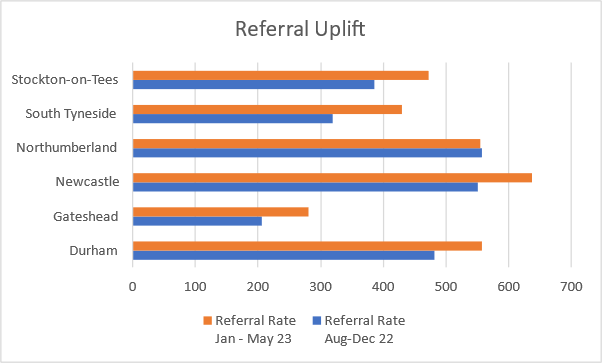Introduction
The North East saw a common challenge across their staff and working together with the TSA have been able to implement a regional wide approach to upskilling staff in digital and technology skills. This upskilling of staff has resulted in increased confidence as reported by staff and an increase in care technology referrals. This case study by the North East region also provides an example of work which fits within our What Good Looks Like for Adult Social Care, particularly success measures Support Workforce and Empower People.
The challenge
As the North East region, councils worked together and identified that there was a lack of knowledge and understanding of care technology by social care staff within the region. Across the 13 councils there were different solutions being developed to tackle this same workforce challenge and we identified that there was a need to collaborate with one solution.
The solution
Virtual houses are a way to showcase care technology without being in a physical location. They can be used by staff, council or care providers, or members of the public. It allows people to go through a digital house and learn about the types of care technology that can be fitted and how they can be used.
Together with the TSA, the North East worked on creating a regional solution, customising the existing TSA virtual house to meet the needs of social care staff across the region. The virtual house was designed as a two-bedroom detached house and was created to provide an immersive learning experience for staff to increase their knowledge and confidence on care technology.
The aim was to boost knowledge and confidence of council staff in understanding and prescribing care technology to people through real-life training scenarios using the virtual house.
The training has different levels which allows for the training to be tailored to the needs of different roles of staff.
All councils were granted access to the virtual house across the region and a comprehensive list of staff were designated to access to the training and house
To support staff and ensure everyone had the right level of digital skills and confidence, a series of drop-in sessions, both face-to-face and virtual, were organized. The flexibility of implementation allowed each council to tailor the use of the virtual house to suit their council needs. For instance Newcastle City Council extended their training to include their carers group.
There was an initial target of 300 staff users to begin with to pilot the approach across the councils. Monthly engagement workshops throughout the pilot phase enabled challenges to be identified and resolved by councils. Weekly league tables added a competitive element, fostering engagement and improving completion rates across the region.
The impact
By the end of the pilot there were a total of 1,110 registered users which far exceeded the initial target of 300 registered users.
It was reported that there was a 95% increase in knowledge and confidence across staff who completed the training. Feedback from Newcastle City Council was that carers also found the training extremely helpful.
There was an increase in referrals across several councils for care technology as shown in the graph below.
How is the new approach being sustained
The North East is currently working on rolling out the virtual house and training sustainably across the region. With some councils looking to make basic training at advocate level mandatory for all staff.
The types of virtual houses have also been expanded to better reflect the types of homes residents live in and now include a house, bungalow and flat. The virtual house license has been extended for 12 months, aiming to involve more colleagues from health and housing, with an expansion into specific topics such as care technology to support challenging behaviour tailored to specialist teams.
The region is also exploring how to extend the virtual house rollout to engage with more housing associations and the North East and North Cumbria ICS.
Council feedback has prompted the addition of factsheets to the program, creating easily understandable guides for service users. These factsheets, co-produced with people with lived experiences, prioritize relatability, jargon-free language, and non-negative wording, including key search terms for online product searches.
Contact: [email protected]

